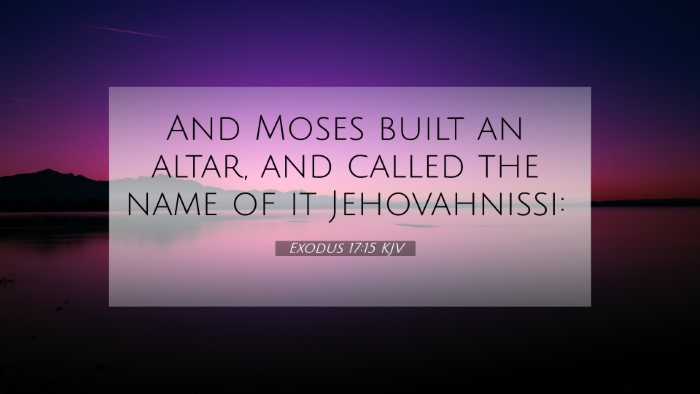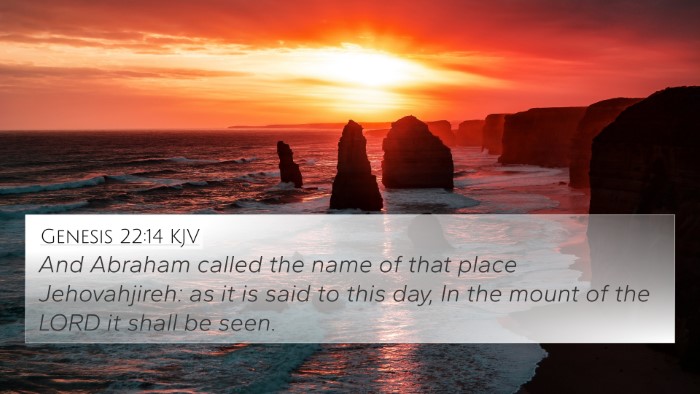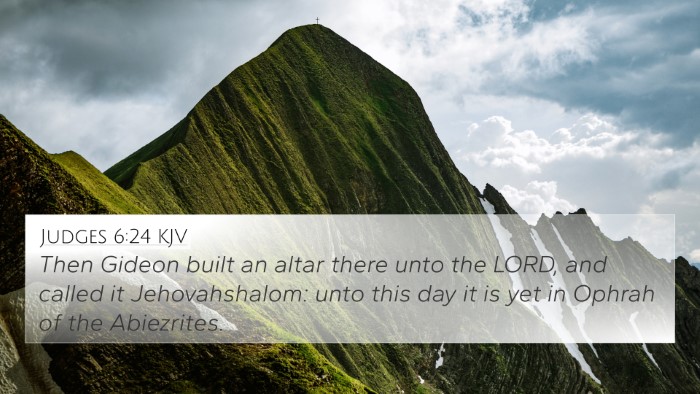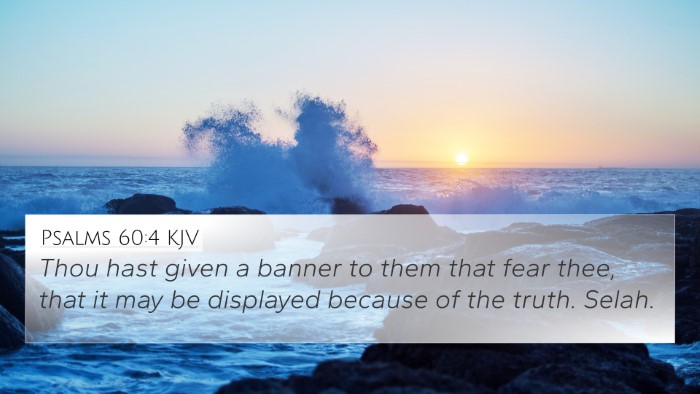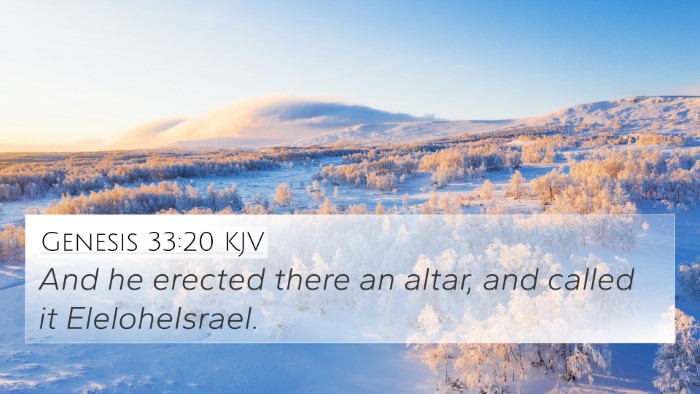Understanding Exodus 17:15
In Exodus 17:15, we read, “And Moses built an altar, and called the name of it Jehovahnissi.” This verse serves as a significant point in the history of the Israelites, reflecting their dependence on God and commemorating His assistance during their battles. The name 'Jehovahnissi' translates to 'The Lord is my Banner,' symbolizing victory through divine intervention.
Exegesis and Commentary Overview
This verse and its context can be understood through various public domain commentaries. Here we summarize key insights:
- Matthew Henry: He highlights that Moses' act of building an altar indicates gratitude towards God. This altar becomes a memorial of the victory over Amalek, emphasizing that the battle was fought not by human strength but by God's power.
- Albert Barnes: Barnes points out that the name 'Jehovahnissi' signifies that the Lord is the one who provides protection and victory. It reflects Israel's reliance on God in their struggles. The altar stands as a physical reminder of a spiritual reality: God fights for His people.
- Adam Clarke: Clarke interprets the altar as a sign of divine favor, suggesting that the Israelites were acknowledging the Lord’s role in granting them victory over their enemies. The altar represents both thanksgiving and a plea for ongoing support from God.
Thematic Connections
Exodus 17:15 connects to various themes and other scripture passages in the Bible, enriching its understanding:
- Divine Deliverance: This verse is pivotal in illustrating God's deliverance. It pairs with Deuteronomy 20:4, which speaks to the Lord fighting for Israel.
- Faith in Battle: The reliance on God during physical battles can be further explored through 2 Chronicles 20:15, where the battle belongs to the Lord.
- God as a Protector: Psalms such as Psalms 20:7 offer parallel expressions of trust in God as the true source of help and victory.
- Remembrance and Worship: The practice of building altars for remembrance is reflected in 1 Samuel 7:12, where Samuel sets up a stone to commemorate God’s aid to Israel.
- Symbol of Authority: The term 'banner' found in this verse connects with Isaiah 11:10, portraying God as a banner for nations and a rallying point for His people.
- Leadership and Intercession: The role of Moses aligns with Exodus 33:15, emphasizing the importance of God's presence in leadership.
- Victory through Obedience: This theme aligns with Philippians 4:13, which assures that believers can do all things through Christ, underscoring strength and victory through divine power.
Cross-Referencing Biblical Texts
To engage in cross-referencing Biblical texts, consider these connections that echo the themes found in Exodus 17:15:
- Exodus 14:14 - God’s promise to fight for Israel.
- Romans 8:31 - If God is for us, who can be against us?
- Exodus 15:2 - The Lord is my strength and song, leading to praise as an altar of worship.
- Psalms 27:1 - The Lord is my light and my salvation; whom shall I fear?
- Isaiah 54:17 - No weapon formed against you shall prosper.
- 1 Corinthians 15:57 - Thanks be to God, which giveth us the victory through our Lord Jesus Christ.
- Joshua 1:9 - Be strong and courageous, for the Lord your God is with you.
Practical Application and Reflection
This verse serves as a reminder of the importance of recognizing God's work in our lives, especially during times of struggle. Building our own 'altars' through prayer, gratitude, and remembrance of God's past provisions can provide spiritual strength and encouragement. In understanding these connections, we see the integral role of faith and reliance on God in our journey, influencing both personal and communal worship.
Conclusion and Summary
Exodus 17:15 encapsulates the essence of dependence on divine strength and the significance of memorializing God's actions in our lives. By exploring this verse through the lens of various commentaries and establishing thematic connections with other scriptural texts, we gain a richer understanding of its implications. This interconnectedness forms a tapestry of faith throughout the Scriptures, where God’s faithfulness and intervention becomes a theme echoing in the hearts of believers across generations.
Key Takeaway: The name 'Jehovahnissi' emphasizes that our victories and protections come from the Lord, reminding us to build altars of remembrance and trust in His ongoing guidance and support.


